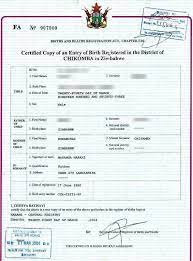Victims of Gukurahundi still do not have birth certificates and national identity documents (IDs) because they are required to produce death certificates of their parents who died or went missing during the 1980s mass killings, according to a report by the Zimbabwe Human Rights Commission (ZHRC).
The victims, in the absence of a death certificate, are required to bring witnesses, who are often scared to testify about the death of their relatives.
Gukurahundi was carried out by the North Korean-trained 5th Brigade in Matabeleland and Midlands in the 1980s which resulted in the death of an estimated 20 000 Ndebele people.
The report is the Commission’s first-ever National Inquiry in a quest to address systemic violations of human rights.
It highlighted several challenges faced by minority groups in accessing national documentation, which results in people failing to enjoy their rights which are enshrined in the Constitution.
In 2019, President Emmerson Mnangagwa met with members of a group of non-governmental organizations, Matabeleland Collective, and part of the resolutions of the engagements was that the government would issue birth certificates, national identity documents and death certificates to the victims but not much has been done.
The ZHRC report highlighted that Gukurahundi-affected communities are reluctant to participate in national processes and lack of lack of truth, healing and reconciliation programmes for them negatively impacts their willingness to try to get national documents, especially when they encounter hurdles in approaching the Deputy Registrar General’s offices.
“Adverse effects of Gukurahundi on accessing national documents, particularly birth certificates and national identity documents are still being experienced. Many people lost documents because of Gukurahundi. Citizens failed to get death certificates from the DRG’s office in cases of missing persons from the Gukurahundi period in the 1980s and this has resulted in generations of undocumented persons,” the report read.
“People affected by Gukurahundi cannot get birth certificates and national identity documents in many instances because they are required to produce death certificates of their parents (who died or went missing during Gukurahundi) or, in the absence of a death certificate they are required to bring witnesses, who are often scared to testify about the death of their relatives.”
Another minority group highlighted in the report are the elderly, who struggle to attain documents either for themselves or for their grandchildren whom they would be looking after.
“Elderly persons above the age of sixty years who have identity cards without birth certificates find it difficult to get birth certificates because the DRG’s offices asked for either their parents or witnesses who are ten years older than them- a requirement that is difficult to fulfil. In addition, the DRG officials do not find it necessary to issue birth certificates to elderly persons because they can be issued with passports without birth certificates. This fact is, however, unknown to many of the elderly persons,” the report read.
“They often lacked appreciation of the requirements, they were too poor to afford costs of registering their grandchildren and their burden is increased when their un-documented grandchildren cannot access food aid, enroll for BEAM or fail to attend school beyond Grade 7.”


Leave a comment